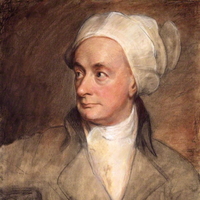Elegy VI. to Charles Diodati, When He Was Visiting in the Country (Translated From Milton)
With no rich viands overcharg’d, I send
Health, which perchance you want, my pamper’d friend;
But wherefore should thy Muse tempt mine away
From what she loves, from darkness into day?
Art thou desirous to be told how well
I love thee, and in verse? Verse cannot tell.
For verse has bounds, and must in measure move;
But neither bounds nor measure knows my love.
How pleasant in thy lines described appear
December’s harmless sports and rural cheer!
French spirits kindling with caerulean fires,
And all such gambols as the time inspires!
Think not that Wine against good verse offends;
The Muse and Bacchus have been always friends,
Nor Phoebus blushes sometimes to be found
With Ivy, rather than with Laurel, crown’d.
The Nine themselves oftimes have join’d the song
And revels of the Bacchanalian throng.
Not even Ovid could in Scythian air
Sing sweetly—why? no vine would flourish there.
What in brief numbers sang Anacreon’s muse?
Wine, and the rose, that sparkling wine bedews.
Pindar with Bacchus glows—his every line
Breathes the rich fragrance of inspiring wine,
While, with loud crash o’erturn’d, the chariot lies
And brown with dust the fiery courser flies.
The Roman lyrist steep’d in wine his lays
So sweet in Glycera’s, and Chloe’s praise.
Now too the plenteous feast, and mantling bowl
Nourish the vigour of thy sprightly soul;
The flowing goblet makes thy numbers flow,
And casks not wine alone, but verse, bestow.
Thus Phoebus favours, and the arts attend
Whom Bacchus, and whom Ceres, both befriend.
What wonder then, thy verses are so sweet,
In which these triple powers so kindly meet.
The lute now also sounds, with gold inwrought,
And touch’d with flying Fingers nicely taught,
In tap’stried halls high-roof’d the sprightly lyre
Directs the dancers of the virgin choir.
If dull repletion fright the Muse away,
Sights, gay as these, may more invite her stay;
And, trust me, while the iv’ry keys resound,
Fair damsels sport, and perfumes steam around,
Apollo’s influence, like ethereal flame
Shall animate at once thy glowing frame,
And all the Muse shall rush into thy breast,
By love and music’s blended pow’rs possest.
For num’rous pow’rs light Elegy befriend,
Hear her sweet voice, and at her call attend;
Her, Bacchus, Ceres, Venus, all approve,
And with his blushing Mother, gentle Love.
Hence, to such bards we grant the copious use
Of banquets, and the vine’s delicious juice.
But they who Demigods and Heroes praise
And feats perform’d in Jove’s more youthful days,
Who now the counsels of high heav’n explore,
Now shades, that echo the Cerberean roar,
Simply let these, like him of Samos live,
Let herbs to them a bloodless banquet give;
In beechen goblets let their bev’rage shine,
Cool from the chrystal spring, their sober wine!
Their youth should pass, in innocence, secure
From stain licentious, and in manners pure,
Pure as the priest’s, when robed in white he stands
The fresh lustration ready in his hands.
Thus Linus liv’d, and thus, as poets write,
Tiresias, wiser for his loss of sight,
Thus exil’d Chalcas, thus the bard of Thrace,
Melodious tamer of the savage race!
Thus train’d by temp’rance, Homer led, of yore,
His chief of Ithaca from shore to shore,
Through magic Circe’s monster-peopled reign,
And shoals insidious with the siren train;
And through the realms, where griesly spectres dwell,
Whose tribes he fetter’d in a gory spell;
For these are sacred bards, and, from above,
Drink large infusions from the mind of Jove.
Would’st thou (perhaps ’tis hardly worth thine ear)
Would’st thou be told my occupation here?
The promised King of peace employs my pen,
Th’eternal cov’nant made for guilty men,
The new-born Deity with infant cries
Filling the sordid hovel, where he lies;
The hymning Angels, and the herald star
That led the Wise who sought him from afar,
And idols on their own unhallow’d floor
Dash’d at his birth, to be revered no more!
This theme on reeds of Albion I rehearse;
The dawn of that blest day inspired the verse;
Verse that, reserv’d in secret, shall attend
Thy candid voice, my Critic and my Friend!

